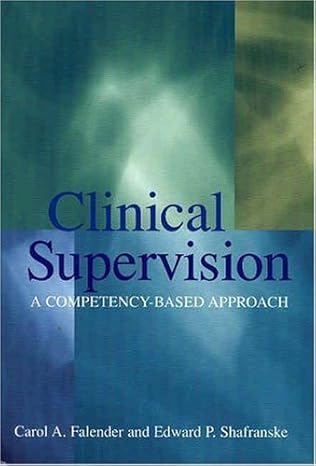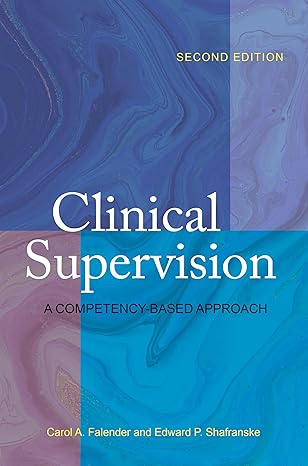封面
Clinical Supervision: A Competency-Based Approach 1 Carol A. Falender (Author), Edward P. Shafranske (Author)
Clinical supervision: A Competency-Based Approach is a resource for training and supervising mental health practitioners. Supervision has for years been central to training psychologists and other mental health professionals in clinical settings, yet supervisors have worked with little or no framework or guidance. Supervisors need no longer tolerate this state of affairs. This presentation of theory and research is tailored to contemporary practice and training requirements, with an emphasis on the identification and development of specific competencies in both trainees and their supervisors. This book guides readers through a science-informed process of supervision that clearly delineates the competencies required for good practice. The authors have geared this approach to mental health professionals who currently provide supervision in academic, training, and treatment settings as well as to students and practitioners who are studying supervision research and theory for the first time. Clinical Supervision provides guidance on both clinical and supervisory competencies and accounts for recent legislative initiatives mandating training in supervision.
Clinical Supervision: A Competency-Based Approach
Dr. Carol A. Falender PhD (Author), Dr. Edward P. Shafranske PhD ABPP (Author)
The highly anticipated second edition of Clinical Supervision is groundbreaking and science-informed, the comprehensive resource for the training and supervision of mental health professionals.
This new edition heralds the substantial progress that has taken place as competency-based clinical supervision has become acknowledged as a distinct professional competence, in keeping with the Guidelines for Clinical Supervision in Health Service Psychology (2014, 2015). Falender and Shafranske provide a unique bridge to practice for supervisors, helping them integrate the latest research findings and emerging practices into a multicultural frame. They cover key areas such as trauma-informed and assessment supervision and telesupervision, and bring empirical support, models, and research into every step of the supervision process.
This comprehensive text describes the essential knowledge, practical skills, and attitudes implicit in the supervisor competence needed to shape the practice of clinicians in training as well as professionals in all settings to enhance competence, develop their professional identity, and shape future practice. Supervisors, supervisees, training and program directors, administrators, students, thought leaders, and researchers will all benefit from this essential volume.
核心内容
-
形式和总结评估:
- 通过应用基于能力的方法,监督者和被监督者共同确定培训目标和目标,以促进特定能力的发展,包括自我评估和反思的能力。他们在临床和监督环境中合作进行反思、理解、计划和实验。监督者使用多种技能来促进学习过程并确保客户的福利。
-
基于能力的临床监督方法:
- 对一些临床监督者来说,基于能力的监督方法可能看起来并不新鲜,因为临床培训一直围绕着能力的发展。然而,明确使用从能力模型中派生的过程可能是有益的,并且对于许多培训项目来说将是新颖的。本文档介绍了开发基于能力的监督方法的理论和程序,并描述了我们认为应指导监督过程的高层次价值观。
-
治疗过程的理解和贡献:
- 鼓励反思性思考,使被监督者考虑他们是如何获得知识的。这种探索导致元认知的发展,即在会话和监督过程中获得对理解构建过程的认识。这种认识允许对方法中的偏见和倾向进行批判性审查,这些偏见和倾向可能会掩盖其他知识来源或实践。此外,反思还应指向价值观和个人优势。
-
案例管理和监督中的学习过程:
- 临床监督实践中涉及案例管理和学习过程。监督者通过具体的案例管理活动,帮助被监督者发展解决问题的能力和临床决策能力。这些活动有助于被监督者将理论知识应用于实际情境,从而提高其专业能力。
-
评估过程:
- 基于能力的方法强调在整个培训过程中设定明确的目标,并识别特定能力所需的必要知识、技能和价值观。因此,可以在培训目标、培训活动和评估程序之间建立高度对应关系。通常在轮转中期和结束时进行评估,作为正式评估,并成为培训记录的一部分。
总结
该文档详细阐述了基于能力的临床监督方法,强调了明确目标、反思性思考、元认知发展和评估的重要性。通过这种方法,监督者和被监督者可以更有效地合作,促进专业能力和个人成长。
致谢
- ix
第1章. 临床监督的实践
- 3
第2章. 什么是好的监督?
- 37
第3章. 构建技术能力
- 59
第4章. 监督中的个人因素
- 81
第5章. 治疗和监督关系中的联盟
- 95
第6章. 监督中的多样性能力构建
- 115
第7章. 伦理和法律视角及风险管理
- 151
第8章. 监督过程的评估
- 195
第9章. 临床监督的演变
- 227
附录A. 监督合同样本大纲
- 233
附录B. 工作联盟清单
- 237
附录C. 跨文化咨询清单(修订版)
- 243
说明
- 本书的章节组织围绕我们视为监督实践基础的主题:有效的监督实践、技术能力、个人因素、治疗和监督联盟、多样性能力、伦理和法律责任及案例管理,以及评估。尽管这些主题为了组织目的被分为不同的章节,但我们认为在实践中它们是相互关联的。


